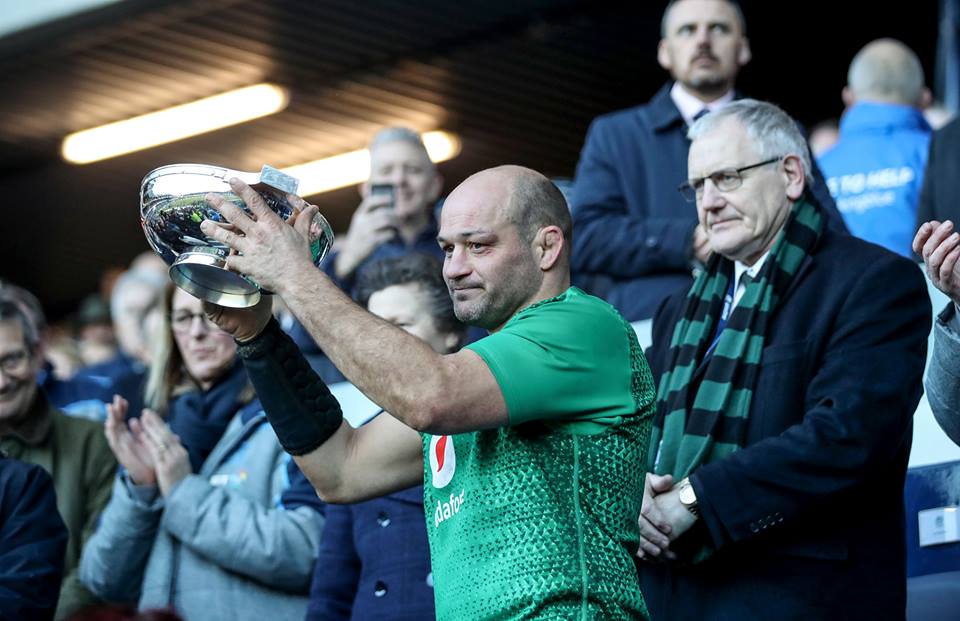
Strong performances should be the objective of any player or coach in any sport (as they lead to results), but there’s no substitute for the confidence that comes from finishing the game on the right of the scoreboard, and on Saturday, Ireland had to fight tooth and nail to earn a win that they needed badly. It was a nervy, error-strewn match that didn’t paint either team in a good light, but sometimes falling over the line is all that matters.
Ireland can breathe a sigh of relief after getting back on track, but once the dust settles, they need to take another hard look at themselves because even though they improved against Scotland, there are parts of their game that have to be addressed. Saturday was a classic mix of the good, the bad and the ugly from Joe Schmidt’s side, and there is plenty to review and dissect ahead of their trip to Italy.
Getting The Basics Right First
The first measure to be taken when trying to get a team out of a slump is getting them to do the fundamentals properly, and Ireland did just that on Saturday afternoon. The early scrums were even enough, but although they conceded a late penalty in this phase of play, Ireland went on to enjoy a dominance at the coalface that will do them the world of good going forward:
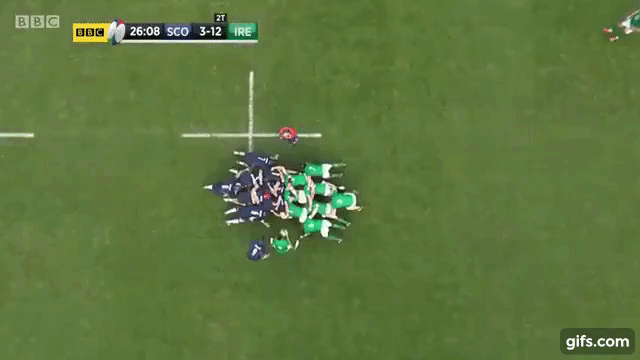
Their lineout functioned efficiently, too, with a 100% success rate on their own throw, on top of a few steals, and after excellent sacking by Scotland in the earlier stages of the game, Ireland inflicted misery on their opponents with their maul. The home side didn’t seem to have an answer for Ireland’s power in this area at times, and you felt that this would ultimately cause them to unravel:
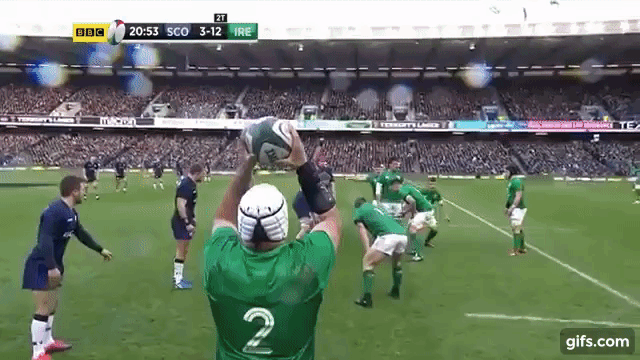

I thought Ireland should have gotten a penalty in the second example above, as there were any number of in-from-the-side offences from Scotland, but Romian Poite had a different opinion. If another official had been in charge of this fixture, Ireland could have gotten a bonus point try from this situation, but at least normal service has resumed with their catch-and-drives.
After some initial quality first-up tackling from the Scottish pack, there was also a welcome (if delayed) return of the characteristic gain line-busting carries from Tadhg Furlong and co.:

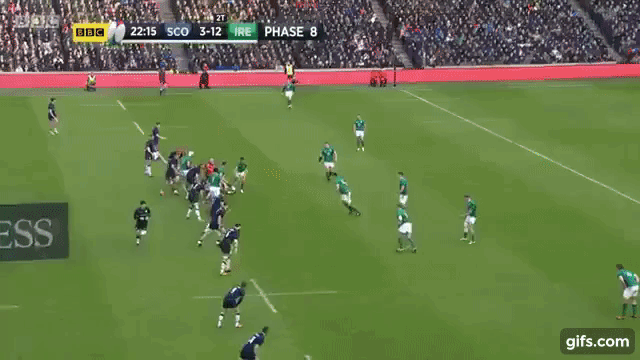
Ireland’s style of attack depends on their forwards winning collisions for several phases in a row and when they don’t get traction up front, the rest of the machine can splutter. There should be more of the same against Italy, but it’s not guaranteed to happen against France or Wales unless Ireland keep upping the intensity game-to-game.
Broken Gearstick
For the second week running, Ireland couldn’t develop any sort of rhythm in attack, and it’s becoming a worry for a team that are usually so proficient at playing multi-phase rugby. There were standout individual displays from Ireland’s backs, most notably Rob Kearney, who demonstrated to his critics that he is still a running threat:
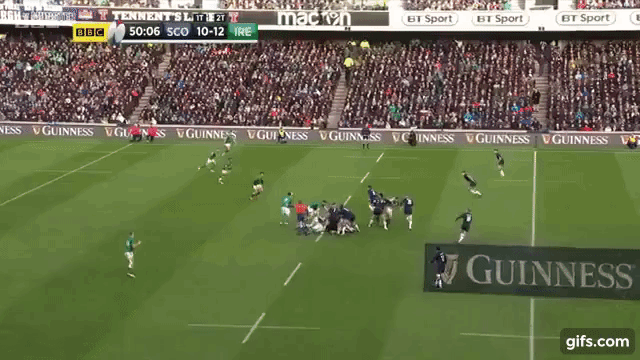
Jacob Stockdale produced an outstanding performance, reminding everyone why he is being talked about as one of the top wingers in the world with lethal finishing from far out:
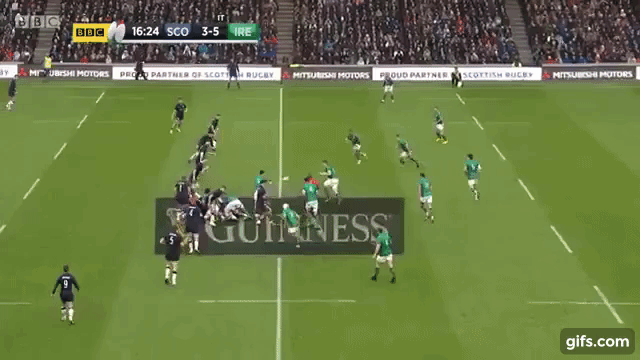
After a shaky start to his introduction to the game, Joey Carbery came up with a scintillating line break and long pass to create a try for Keith Earls that essentially won Ireland the match:

In spite of all this, Ireland had the same system errors in attack that plagued them against England, with slow ruck ball proving once again to be a thorn in their side:

As with the maul, Poite was selective in what laws he wanted to enforce, and as narky and pedantic as he was with not letting players contest on the ground, he had absolutely no problem with them coming in from whatever angle they liked:

Ireland’s forwards became visibly frustrated with this as the match progressed, and it has to be remedied quickly. Saturday evening showed that regardless of who Wales have on the field, their primary focus in defence is denying their opposition clean, fast possession, and France and Italy will have taken note of Ireland’s struggles in this facet of the game.
Ireland were unsettled by England’s line speed in defence the weekend before last, and Scotland adopted the same approach as Eddie Jones’ side, rushing off the line as soon as the ball left the base of the ruck:
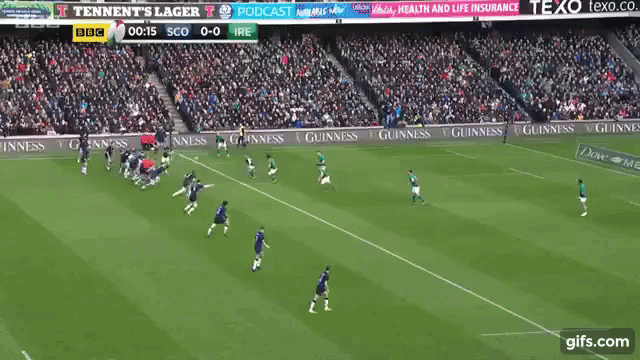
As mentioned before, the Irish forwards failed to win the collisions in the opening part of the game, and the blitzing from Scotland was the main reason for this. It was the same in wider channels, with aggressive gang-tackling preventing Chris Farrell from making as many of the busts in midfield that he has built his reputation on:

It was a laudable, concentrated effort and credit has to go to Matt Taylor for drilling his players so well during the week. Scotland may have lagged a little bit in the second half, but they coped with Ireland’s heavy-carrying tactics better than a lot of other sides, and if they can replicate that kind of intensity and organisation in Japan, they could discommode Schmidt’s team again.
One of the other factors behind Ireland’s attack not functioning properly in the first two rounds of this year’s Six Nations is the below-par performance levels from Conor Murray. It’s a mystery considering that he hit the ground running for Munster since returning to action from injury at the end of November right the way through to his last appearance for them this season, against the Exeter Chiefs in Round 6 of the pool stages of the Heineken Cup.
Once he put on a green jersey, though, he reverted to the bad habits that we saw from him when he played in his first Six Nations: taking years to get the ball out of the ruck and box-kicking too long. The most concerning aspect of Murray’s performances has been his infrequent sniping, which is stopping Ireland from varying their attack and that’s what they could do with more than anything at this moment in time.
Both England and Scotland have halted Ireland’s progress with ball in hand by blitzing them the whole way across the line, meaning that if Ireland try to carry one-out, crash it up in midfield or spread the ball to the wings, they are suffocated and either get caught behind the gain line or knock the ball on. When a team defends like this, it leaves a momentary gap between the ruck and the first defender, and this space is best taken advantage by a dart from the attacking scrum-half.
If the 9 makes a break by doing so, it causes the defending side to second-guess themselves on the next phase and, in turn, slow their line speed, giving the team in possession more time and space on the ball. Murray only sniped once against Scotland and why he didn’t do it regularly is puzzling, given how it forced the Scottish defence to sit back on their heels.
John Cooney got Ireland’s attack motoring nicely when he came off the bench against England (who admittedly had switched off after scoring their fourth try), and selecting him to start against Italy next week might benefit everyone: it gives a form player a chance to show what he can do from the off, it allows Ireland to attack with quicker ruck ball and it lights a fire under Murray (a world class player but one who is at a low ebb).
Character-Building
The biggest positive to be taken from this game for Ireland was the performance of Joey Carbery after he was brought on to the pitch in trying circumstances. There has been a long-held opinion by many (myself included) that if Johnny Sexton gets injured, Ireland fall apart, but Carbery guided them to a win in difficult conditions, and that was after throwing an intercept try. In a way, it was a microcosm of Ireland’s performance on the day: not perfect but one that bodes well for the future.
As with their fortunate victory over France last year, games like Saturday’s one strengthen the resolve of teams and when they face challenges further down the line, they can call on the experience that they gained from days like this. Ireland have much to do, but they are slowly bouncing back from a depressing opening-day loss that had the potential to derail not only this tournament but the rest of this year. That’s what champion sides do, and winning silverware in 2019 remains a possibility for Ireland.

Nice One John!
LikeLiked by 1 person